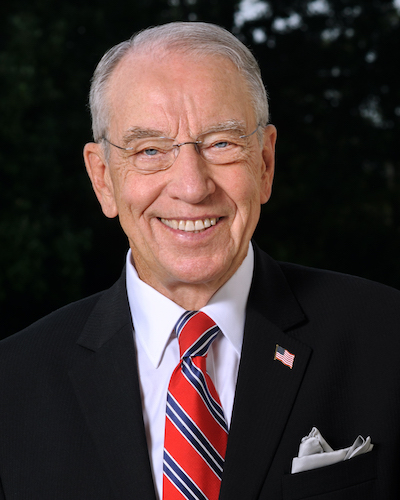Iowa’s Senators Chuck Grassley and Joni Ernst rarely land on opposite sides of any issue, but it happened on an important U.S. Senate floor vote on August 7. Iowa’s senior senator was among eighteen Republicans who joined Democrats on a procedural vote to advance a bipartisan infrastructure bill. Ernst was among the 27 Republicans who voted against the motion, which needed 60 votes to pass.
Grassley has not been among the 20 senators negotiating the bipartisan bill. He has spoken favorably of federal spending on projects like roads, bridges, airports, and broadband, but said this week “the big hold-up for me” on the infrastructure proposal is whether the “pay-for” provisions to cover the costs are real or just “gimmicks.”
A vote for the final version of this bill would be another data point suggesting Grassley intends to seek re-election in 2022.
Senate Majority Leader Chuck Schumer has said the Senate will not adjourn for its traditional August recess until after the bipartisan bill has passed. The legislation would spend about $1 trillion, with a focus on “physical infrastructure.” Democrats plan to pass a larger spending bill including “human infrastructure” provisions such as child care, education, and higher wages for home health care workers.
The full text of the bipartisan bill is here. Emily Cochrane, Christopher Flavelle and Alan Rappeport reported for the New York Times on some of President Joe Biden’s priorities that were dropped from the compromise. Laura Michelle Davis and Clifford Colby reported for cnet.com on some of the big ticket items remaining in the bipartisan bill:
- $39 billion for mass transit
- $66 billion for passenger and freight rail
- $25 billion for airports
- $17 billion for ports and waterways
- $110 billion for roads and bridges
- $12.5 billion for electric vehicles
- $55 billion for water infrastructure
- $73 billion for power grid improvements
- $65 billion for broadband
I haven’t seen any public statement from Grassley or Ernst on Saturday’s votes but will update this post as needed.
UPDATE: Jamie Dupree reported in his must-read newsletter on Congressional happenings,
LEGISLATIVE NERD NOTE. When Sen. Bill Hagerty (R-TN) vowed on Saturday to object to any deal leading to a quick Senate vote on infrastructure, he also unwittingly undercut fellow GOP Senators who wanted to bring up a series of amendments. Yes, this is procedurally geeky, but stick with me.
SUBSTITUTE. Right after the Senate voted to shut off debate on Saturday, Sen. Tom Carper (D-DE) offered an amendment setting out the effective date of the bill. Because of the procedural situation involving the amendment tree – Carper’s amendment will elbow out about 20 GOP amendments to the bill.
NO DEAL. In other words, if there is no agreement to speed up the final vote on infrastructure, don’t look for votes on any possible Republican changes to the bill. They can thank Hagerty for submarining his own colleagues.
Grassley expects to vote on Republican amendments to the package.
LATER UPDATE: Grassley and Ernst both voted against a cloture motion on the bipartisan infrastructure bill August 8. The Senate approved that motion by 68 votes to 29 (roll call). Burgess Everett and Marianne Levine reported for Politico,
Hagerty on Sunday afternoon attempted to bring up 17 amendments by unanimous consent, but Sen. Kyrsten Sinema (D-Ariz.) objected, citing his refusal to come to a time agreement and potential objections from other senators. […]
“We have wasted all day Thursday, Saturday and now through Sunday,” said an exasperated Sen. Chuck Grassley (R-Iowa). “That’s enough time to vote on a multitude of amendments, and we just sat around those three days, accomplishing nothing.”
Grassley voted against ending debate Sunday, citing his complaints about the amendment process. However, he told reporters after that he’d still support final passage. The infrastructure bill could theoretically be amended after Sunday’s vote. But that would require cooperation from all 100 senators, making the prospects unlikely.


No Comments